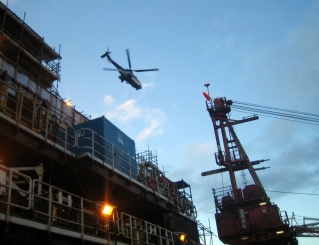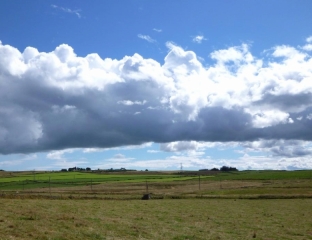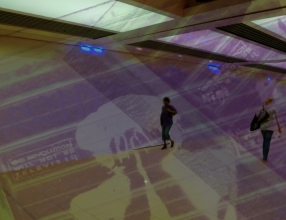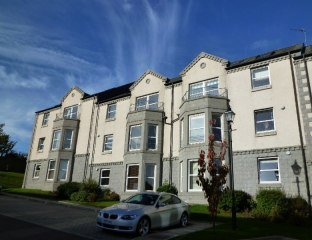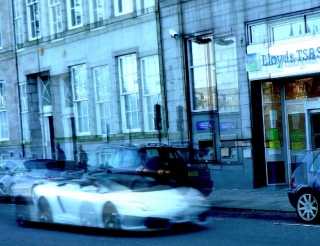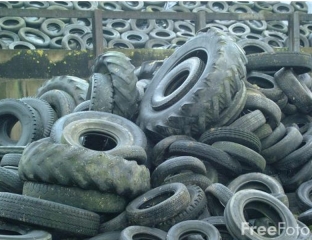Happy 9-month birthday to Aberdeen Voice! And Old Susannah’s column has now been running for 6 months.
I was having a quick lemonade with Fred Wilkinson (or ‘Freditor-in-Chief’ as I call him) and he explained how the Voice was born. He was talking to friends, and they were discussing whether it was possible to create as great, impartial, investigative and intelligent a newspaper as the ones we already have in Aberdeen, and they decided to give it a go.
Nine months later, there are dozens of contributors and thousands of readers – but no advertisers the Voice is beholden to.
There are three things I particularly love about the Voice itself.
- The first is that absolutely anyone who has something reasonable and coherent to say is welcome to submit an article.
- The second is the stories the Voice has broken. For instance, when Trump’s organisation explained to the world’s media that they never considered the use of compulsory purchase orders at Menie, Voice published an excellent article proving this simply was not the case.
When Councillor Malone told the Press & Journal that only ‘about one’ Aberdeen resident contacted her objecting to the deer cull, the Voice’s readers sent in proof to the contrary in spades. And while the Union Terrace Gardens situation gets murkier and more confusing by the minute, the Voice breaks important developments that that are not covered in other local press publications….. for some reason.
- The Third great thing about Aberdeen Voice to me is the growing number of readers that are getting involved. People are writing in to the Voice for more information, contacting their elected officials on matters featured in the Voice, and are writing to Voice contributors with important leads, comments and very kind words of encouragement.
Then there are the people who make the Voice a reality. First there is Fred Wilkinson (or ‘Dave’ or ‘Wilkinson’ as Councillor Malone calls him), the editor-in-chief. He has two teenage children, his band, and a host of other projects and yet he finds the time to bring all the contributions together, chase down delinquent sub editors and bring together edition after edition for publication on time, every week.
Mike Shepherd and Sarah-Jane Duffus are two of the leading Union Terrace Gardens writers and activists. Their energy and dedication to saving the city’s only centre park, not to mention probably the most valuable, irreplaceable and beautiful city centre civic asset in Aberdeen, is admirable. It is no wonder that they have ACSEF worried and complaining publicly that the UTG Friends are ‘organised’. They bloody well are.
Rob is the Aberdeen Voice ‘tech guy’ who has a dozen or so of his own projects going, yet can show up to take amazingly high quality photos on breaking stories with lightning speed.
I was honoured then and more so now to be part of this amazing group of people
He has the patience of several saints and continuously improves the technology behind the Voice; its growing readership has meant lots of work for Rob – who also has to try and get me up to speed with technical developments – not an easy task.
I also owe a debt of thanks to Rhonda Reekie, who writes on a variety of subjects. Some six months ago she contacted me and wondered if I’d like to consider writing something for the Voice. Well, six months on and I really must thank the Council and the Big business interests for continuously generating material to write about. I was honoured then and more so now to be part of this amazing group of people and this much-needed and much-enjoyed electronic newspaper which is Aberdeen Voice. Thanks.
I was sick for two weeks, during which the world has become overcome with problems from Libya to Japan. Closer to home, the Scottish Parliament decides not to call in the Loirston Loch stadium plan (as one fellow objector put it, ‘I am surprised they had time to open the envelope, let alone weigh up the issues.”).
One minute we are to kill deer, then no, then yes. To make matters worse, it looks like Stewart Milne homes are losing money, as young would-be purchasers are having their mortgage applications rejected – home sales in the Milne Group may be down as much as 20%. No wonder the poor man wants to increase parking costs at Pittodrie. It’s more than Old Susannah can keep up with.
I was, however, very pleased when I heard about the lorry-load of cement that was dumped on Aberdeen’s roads; I thought it was a great way to fill in some of the potholes. Sad to say, it turned out that this was a mistake, and not a cunning plan by our Council (well, it did sound like the kind of thing they might do). When I finally got out of my sickbed, I was shocked to find that a pothole on Victoria Road had been filled in.
If you don’t do return your form, you will be deemed to have ‘taken leave of your census’ and may be fined.
This was also a bit sad for the locals, as we’d been planning on stocking this particular hole with trout. The material filling the hole doesn’t appear to have been ‘tamped down’ at all, and it is of a completely different material than either the road or all the other patches. I have every confidence it will last as long as the other road mends have done. I give it two weeks.
Tuesday was busy – first it was the excellent Mark Edwards ‘Hard Rain’ exhibition and presentation at Aberdeen University. I fully recommend a visit to see the work which will be up for a month. Immediately afterwards I raced to Peacock Visual Arts which hosted ‘Run Down Aberdeen’ – another excellent film by Fraser Denholm and Mike Shepherd. I missed the film – which you can now get online – but was entertained by the panel discussion featuring Fraser, Councillors Martin Greig, Kevin Stewart, and Lewis MacDonald MSP.
The gallery was packed, including the area just outside the gallery. I did get a chance to ask if there was any connection between Stewart Milne’s Triple Kirks plan and the desire to turn our Victorian garden into a parking lot. I didn’t exactly get an answer.
Right, time to define some of the terms arising of late. Apologies for the long intro.
Census (noun) A polling of individuals and householders, usually undertaking by governments, in order to aid future planning.
We are currently all receiving our Census forms, which must be returned by 27 March. No doubt the post office will provide its usual swift service and not a single form will be lost. If you don’t do return your form, you will be deemed to have ‘taken leave of your census’ and may be fined.
It is unfortunate that the population can no longer respond with “Jedi Knight” as an answer on the religion question
But you will, of course, want to reveal to the government every detail of your life, family, health, finances etc. That’s how they keep giving us the great, forward-thinking services enjoyed today by the elderly, people with special needs, school children and the poor. The number of bathrooms in your house is crucial to these calculations.
(Naturally all details will be kept strictly confidential – unlike all of the past instances of confidential information being left on trains, leaked or lost).
Aberdeen couldn’t be the great place it is if 10 years ago people hadn’t done their census forms. It is just unfortunate that we’re closing our schools down while at the same time building new ‘affordable homes*’ on every patch of green that still exists. I guess the Census back then must have said our population would quadruple.
It is unfortunate that the population can no longer respond with “Jedi Knight” as an answer on the religion question. This is unfair discrimination against Jedi Knights, and just goes to prove that the dark side of the force is in control in Scotland. Any resemblance between Ms Dean and an Imperial Storm Trooper (or one of those furry muppet alien squeaky things) might be more than coincidental. May the Farce be with you – get those Census forms in.
*Affordable Housing (noun) dwelling places priced lower than fair market value, intended to benefit people with low incomes.
Are you a multimillionaire feeling the pinch? Need to build some luxury des-res homes in the greenbelt (where there is no VAT to pay on the land) in a hurry and cheaply? Need to convince those sceptical, uncooperative, incisive Councillors that new housing should be built rather than old buildings converted? Well then, ‘affordable housing ‘ is your ticket to your next few million.
The local authorities will always give you planning permission anyway, but the phrase ‘affordable housing’ is music to their ears: it will help them to justify the approval to build your unique, individualistic, state-of-the art homes where endangered species currently roam unchecked.
You’ll probably get a tax break for building ‘affordable homes’ as well.
There is dancing in the streets today as people rejoice over the 1p reduction in the price of motor fuel
What happens is this: your development goes up, and you build say 2 to 4 ‘affordable homes . The press tells the world what a great guy you are, and announces the date for the homes to be sold. People then queue up on site to buy these bargains for days in advance of the sale. The first few people get the homes, and move in to spend many happy years living in a luxurious new development.
None of these buyers will instantly sell their bargain property for a massive profit – that would be morally wrong and would defeat the purpose of ‘affordable housing’ in the first place.
Budget (noun) a set list of rules for fiscal expenditure.
In the UK the budget is set by established financial wizard and genius, George Osborne.
There is dancing in the streets today as people rejoice over the 1p reduction in the price of motor fuel. People can now fill their tanks for about 17p less than before. What will you do with your 17p? You could put it towards the cost of a drink, but it won’t pay for the increased cost of your cigarettes (which you should really quit anyway – unless you’re immortal and super-rich).
The ‘coalition’ government was no doubt left with a huge mess to clean up, and bombing Libya will no doubt go a long way to helping us get back on our feet. Or something. We did after all sell Libya all those finely crafted, UK made handcuffs, riot gear, clubs and shackles – time to capitalise on the investment.
By bombing them, we’re making more money for UK Defence Contractors. Result!
The old joke was ‘A capitalist is someone who will sell you the rope they are going to hang you with’. The Libya situation is an interesting take on this sentiment. Clearly nothing is more important than British Jobs – and the idea of weapons large and small no longer being made in the UK is too much to bear.
The North Sea Oil industry will be stumping up an extra few pence in tax, and George Osborne has promised to close some of the tax loopholes exploited by the rich for decades. I just hope none of our important, famous multi-millionaires are troubled by this budget. Somehow, I doubt they will be.
Next week – more definitions and a look back at some of the Old Susannah outstanding issues

